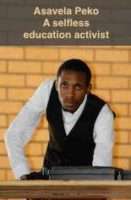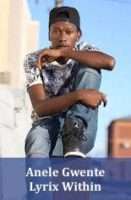Harsh living conditions in the remote rural areas can deprive people of growth opportunities, and it’s many a villager’s wish to start a better life somewhere else. Twenty-one-year-old law graduate Phiwokuhle Mnyandu had to travel hundreds of kilometres to quench her thirst – for education.
“I grew up in a rural area called Ingwavuma. At my house we had a wood stove and I grew up fetching water. We only got electricity late in primary and we had a dysfunctional tap in our yard. Water would only come out twice a month (if not less) and sometimes it would be dry for six months straight. At such times we would use the boreholes,” Phiwo recollects.
Just like in several other households in South Africa, it was the grandmother who tightly held their bodies and souls together.
“My mom is the youngest and we grew up in a big extended family from my maternal side. My granny worked at the local hospital as a chef and she would bring us crusts of bread from work so that we could have school lunch-boxes. We struggled but my grandma was always there for us.”
Phiwo has one sibling, Sthembile. She cites that their mother was disrespected for being unemployed, something that still unsettles her.
“It is really hard growing up in a family where each and every family member openly undermines your parent, simply because she is unemployed and also doesn’t have a matric. In her last year of school, she was diagnosed with a certain brain illness … which she takes medication for. She stayed home while everyone was at work. There would be family meetings and my family would intentionally exclude her.” Phiwo adds she believes her mother was pregnant with her when she failed her matric.
“Growing up in an extended family is not easy. You see all the [fancy] things your [cousins] have but you know your [mom] cannot provide them. You have no other choice but to be content with what you’ve got because there is nothing you can do about it. My mom survived all this [exclusion] and that’s when I saw how strong she was.”
The same way she filled up her bucket with water at the boreholes, Phiwo filled her head with knowledge at school.
“I began to realise that my sister and I were actually kind of smart, and so God has a plan for us. I noticed this through the certificates for academic achievements that my sister and I received at prize giving days at school, both in primary and high school.
“My mother may be seen like she is nothing but she gave birth to two beautiful flowers that will blossom one day. As I started getting older and wiser, I saw that although we didn’t have it all then, but we could have it all later on,” she says. Phiwo was always one of the youngest in class but her intellect made her immune to any mockery because, “You can’t undermine someone and later come for their help.”
She soon ‘reaped’ rewards from her hard work after REAP (Rural Education Access Programme) spotted her talent.
“I applied for REAP in matric, 2011. The principal brought the forms to our class from a neighbouring school and he chose the five top students to apply. There were interviews held later on at the end of the year … and three days later I [was informed] that I had received university funding. This is one of the greatest days of my life,” she says, excitedly.
Phiwo remembers her relocation to Johannesburg after getting a placement at the University of Johannesburg (UJ).
“It was overwhelming. I just wanted to cry because I missed home so much, and Johannesburg is cold, and I suffer from ear problems and that made matters worse. I remember the day I left home. Our youth Pastor, Pastor Khulani Mngomezulu, [accompanied] me to the taxi rank which is forty-seven kilometres away and waited there until Joburg taxis were full.” A woman she knew from back home took her to the taxi ranks when she got to Joburg, she adds.
It soon hit her that all she had in Joburg was her “huge suitcase”. She describes the experience: “The hardest day was when I got to the residence. I saw other first year students being dropped off by their parents, and almost their entire family – and I was here alone. I had never felt so alone in my life but I consoled myself by telling myself that God knew I could handle it. My family would be here if they could but circumstances did not allow, so I had to be a big girl and deal with it.”
However, REAP wasn’t going to take her out of the rurals and abandon her in the big city.
“REAP was the only family I had in Joburg. I would recommend REAP in a heartbeat; they really changed my life. They only want what’s best for us and do what is best for us as well. I failed one module in third year but REAP still funded me, and then I passed the module in my final year with my other final year modules. It is a holistic organisation.”
Something that struck Phiwo about Joburg was how culturally diverse and different it was from KwaZulu-Natal.
“The lifestyle is unique, the morals and values are different. Back at home when you come across anyone you greet them regardless of whether you know the person, in order to acknowledge them and out of respect. Here there’s [proper sanitation] but back at home we use a dish to bath, we still get water from the boreholes, the toilet is far away. For the first time I got to eat out when I came here. Eating any sort of takeaway was a luxury,” she says, humorously.
Phiwo took part in student upliftment programmes on offer, and believes education is a great equaliser. She explains: “Education is very important. It takes two different people from two different backgrounds and places them in one level or standard. You get to be classmates with people who went to nice ‘Model C’ schools while you went to a public school, but who can tell? No-one. We are all now in one class doing the same course and striving to be better people in life. You can never be too educated, because it opens doors for you.”
Despite all the adjusting she had to do, Phiwo finished her law degree in 2015 and is currently studying a postgraduate diploma in Labour Law at UJ, while working. She’s an Administrative Assistant at Student Accommodation and Residence Life (SARL), but the calling to be a lawyer still screams loudly.
“I had always said I wanted to be a lawyer cos I loved advocating for people even when I didn’t have to. What motivated me more was seeing lawyers on TV with gowns and the silk and I would think to myself, ‘One day that will be me’. The mere fact that I have graduated in law does not make me better than others. God has plans for us and I never underestimate the opportunities given to me. My current job is preparing me for an occupation in my field of study.”
Phiwo says she hopes law will allow her, “to provide for my family and also implement the plans I have for my hometown.” She may have left Ingwavuma but it’ll always be that piece that completes her puzzle.
“I still get prayers from home and the constant phone calls from mother and sister. Their care and thoughts about me keep me going. I am inspired by my background. . It would be honouring and humbling to do something great for mom because I have plans for her. Where I come from does not determine where I am going. The fear of failure inspires me – nothing scares me like failure.”
As someone who was handpicked out of disadvantage, Phiwo gives back by dedicating her spare time to helping others.
“I assist high school pupils with tertiary application and bursary forms. I plan on continuing with giving motivational talks when I can. I want to open an internet café so that learners get a hang of how to use computers and also to expose them to how the internet works. I want to open a mobile library as well.”
Phiwo credits her success to REAP student advisors, her church, her mother, “and most importantly, God.” She also says, “I’m grateful to my boss, and his secretary too, for giving me the opportunity to work with them. It’s humbling when people trust you to carry out certain duties and wanting you to do better.”
Perhaps, Phiwo could be summed up with her two favourite quotes: ‘It’s always dark before dawn,’ and, ‘Aim for the moon so that when you fall, you may fall amongst the stars.’





